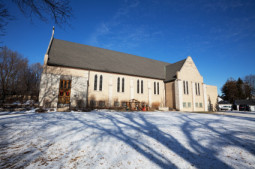< prevnext >

Article:
Religious/Church Property Valuation and the Shortfalls of the Church Appraisal Process

Conventional valuation techniques as applied to religious facilities may not always reflect the real world for this property class. While Chicago area neighborhoods may rise and decline with commercial property values gyrating up and down, religious facilities sometimes follow their own course.
In appraising church/ religious facilities appraisers usually rely only on the cost and sales approaches. Most religious facilities are owned and not rented and the income approach generally is not a traditional value indicator. As a result, church appraisers tend to ignore income altogether. While we agree that the income approach is not applicable from a property rental or investment perspective, the financial strength of a congregation and property operating costs may be of vital importance from underwriting and marketability standpoints . Overlooking income issues altogether may shortchange the church appraisal process.
Consider for example, that a Chicago congregation may be on the brink of total economic and membership collapse; but, the church appraiser wouldn't know because they wouldn't even think to ask about it because in his mind his concern is only with the church cost and sales comparison approaches. A large older historic Chicago church may have a capacity to seat 400 people at a service (that only 125 attend), have a huge sanctuary area and be very expensive to heat, air condition and maintain. These are economic issues; however, that a church appraiser may easily overlook.
If a hotel was running at 15% occupancy you can bet that its income, expense and occupancy levels would be "front page news" and would have substantial impact on the value conclusion. Why is it that with regard to the appraisal of religious facilities, crucial information regarding utilization and expenses rarely merits a mention in most church appraisals?.
There are many factors that influence the value of a church or religious facility: Its size, location and layout matter (as with every other property class). These factors can impact the ability of a congregation to succeed and therefore pay off a loan. Important potential indicators of church facility obsolescence can be detected and are often reflected in its census or financial information as reported over many years.
A well located, well designed religious facility only "cash flows" if it has a financially strong congregation with the inverse also true. If your bank has a church appraised and doesn't consider these factors, your loan collateral may or may not be what you hoped. Religious Property Valuation, Ltd. focuses on appraisals of churches and religious facilities in the Chicago metropolitan area and in the Midwest.
In appraising church/ religious facilities appraisers usually rely only on the cost and sales approaches. Most religious facilities are owned and not rented and the income approach generally is not a traditional value indicator. As a result, church appraisers tend to ignore income altogether. While we agree that the income approach is not applicable from a property rental or investment perspective, the financial strength of a congregation and property operating costs may be of vital importance from underwriting and marketability standpoints . Overlooking income issues altogether may shortchange the church appraisal process.
Consider for example, that a Chicago congregation may be on the brink of total economic and membership collapse; but, the church appraiser wouldn't know because they wouldn't even think to ask about it because in his mind his concern is only with the church cost and sales comparison approaches. A large older historic Chicago church may have a capacity to seat 400 people at a service (that only 125 attend), have a huge sanctuary area and be very expensive to heat, air condition and maintain. These are economic issues; however, that a church appraiser may easily overlook.
If a hotel was running at 15% occupancy you can bet that its income, expense and occupancy levels would be "front page news" and would have substantial impact on the value conclusion. Why is it that with regard to the appraisal of religious facilities, crucial information regarding utilization and expenses rarely merits a mention in most church appraisals?.
There are many factors that influence the value of a church or religious facility: Its size, location and layout matter (as with every other property class). These factors can impact the ability of a congregation to succeed and therefore pay off a loan. Important potential indicators of church facility obsolescence can be detected and are often reflected in its census or financial information as reported over many years.
A well located, well designed religious facility only "cash flows" if it has a financially strong congregation with the inverse also true. If your bank has a church appraised and doesn't consider these factors, your loan collateral may or may not be what you hoped. Religious Property Valuation, Ltd. focuses on appraisals of churches and religious facilities in the Chicago metropolitan area and in the Midwest.



